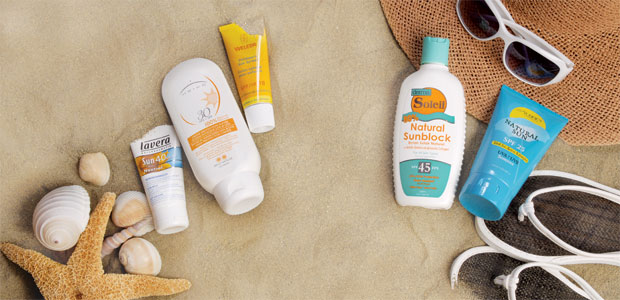Advertisement
Sun-Kissed Skin
Choose natural sunscreen

The sun can be your skin’s worst enemy. It can encourage premature aging and cause skin cancer, collectively the most common form of cancer in Canada. When it comes to sun exposure, the bottom line is this: protect yourself or pay the price.
Sunscreen can help protect our skin against light, heat, infection, and injury, but cancer prevention is paramount. According to a report by John E. Adams, MHA, MD, featured in the Journal of the Canadian Medical Association: “A person’s risk of sun-induced skin damage and probably skin cancer increases with his or her level of total cumulative exposure to the sun and number of sunburns.”
The Canadian Safety Council reports that 80 percent of skin cancers occur above the neck, so it is critical to protect the head, neck, lips, and ears.
Lise Alschuler, ND, naturopathic physician and co-author of the Definitive Guide to Cancer (Celestial Arts, 2007), offers this advice: “You can protect the skin from skin cancer by wearing appropriate clothing, a wide-brimmed hat, sitting in the shade, and using a nontoxic sunscreen.”
Natural & Nontoxic
The problem is that some sunscreens contain toxic ingredients that can do more harm than good. Because the skin absorbs as much as 60 percent of what it comes in contact with, it makes sense to reduce the number of toxins that penetrate the skin by choosing natural sunscreen.
Toxic ingredients in some sunscreens include artificial colours, phthalates found in most artificial fragrances, and parabens. These and many other toxic compounds have been shown to cause a wide range of symptoms and illnesses, including cancer.
According to Myra Eby, co-author of Return to Beautiful Skin (Basic Health Books, 2008), natural ingredients to look for in a nontoxic sunscreen include natural vitamin E (D-alpha tocopherol), aloe extract, and allantoin from comfrey. Zinc oxide is also a safe and effective sun-blocking agent.
There is no need to avoid the sun entirely. However, if you are going to be in the sun, do yourself–and your skin–a favour by protecting it with a natural and nontoxic sunscreen.
The Vitamin D Connection
Don’t stay too far out of the sun. When exposed to sunlight, the skin synthesizes vitamin D, an important health-promoting nutrient. “Vitamin D is essential but we don’t need an excessive amount of sun exposure to get the amount required,” explains Alschuler. She also points out that eating foods such as cold-water fish and dark green leafy vegetables will help us get the vitamin D we need.




